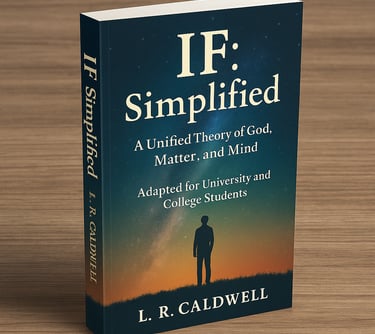FAQ
The most common question I am asked is, 'Do you believe in God?'
My reply - "Yes — but not in the way most people define the term.
Is God consciousness?
"Not exactly — but consciousness is undoubtedly one of God’s fundamental qualities."
Frequently Asked Questions about CSFT (Consciousness-Structured Field Theory)
Section 1: Questions Commonly Asked by Theologians
1. Is CSFT compatible with belief in God?
Yes. CSFT does not contradict the idea of God. Instead, it proposes that consciousness is the foundational reality — an idea shared by many theological systems. If one defines God as the eternal source of consciousness and order, then CSFT can be viewed as a metaphysical lens that gives structure to that divine reality, without prescribing any particular religious doctrine.
2. Does CSFT deny the soul or spiritual existence?
No. CSFT proposes that each conscious being is a structured expression within a universal field of consciousness. This is compatible with spiritual notions of a soul, not as a separate entity, but as a unique resonance pattern with continuity beyond physical form.
3. How does CSFT view life after death?
CSFT is metaphysically open to the idea that consciousness does not end with biological death. Since consciousness is not seen as a byproduct of the body, it is possible that some resonance continues beyond the collapse of the physical structure, potentially in a new form or pattern, aligned with many theological views.
4. Can CSFT bridge science and faith?
Yes. CSFT is designed as a metaphysical framework that respects empirical boundaries while addressing what science alone cannot explain, such as qualia, meaning, and the origin of structure. It offers a logical structure that believers in God can engage with philosophically and scientifically.
Section 2: Questions Commonly Asked by Philosophers
1. How does CSFT relate to Leibniz’s monads?
CSFT builds on the concept of monads by treating them as structured resonance nodes within a field of consciousness. While Leibniz saw monads as indivisible, windowless units of perception, CSFT updates this by embedding monads within a resonating field that explains how structured perception arises and interacts.
2. Is CSFT compatible with the Principle of Sufficient Reason?
Yes. In fact, CSFT depends on it. The theory argues that consciousness must be the foundational principle because matter alone cannot explain the emergence of experience, logic, or identity. CSFT frames consciousness as the necessary structuring principle — the reason behind the order of the universe.
3. How does CSFT avoid panpsychism?
Panpsychism claims consciousness is a property of all matter. CSFT instead claims that matter emerges from consciousness. That reversal is key: rather than assigning awareness to particles, CSFT says particles are the result of structured excitation within the field of consciousness — a deeply metaphysical distinction.
4. Can CSFT be logically consistent without empirical support?
Yes. Many valid metaphysical theories — such as causality, identity, or logic itself — are not empirical but foundational. CSFT is offered not as an untestable belief, but as a logically necessary starting point for making sense of the known limits of materialist assumptions.
Section 3: Questions Commonly Asked by Scientists
1. If CSFT is unmeasurable, how can it claim scientific relevance?
Scientific relevance does not require direct measurability — it requires logical alignment with empirical patterns. Just as dark energy or string theory propose structures beyond current instruments, CSFT offers a foundational model that explains why certain empirical anomalies (like qualia, unity of self, or non-local cognition) persist. It is not anti-science — it is pre-scientific in the same way spacetime once was before measurement tools caught up.
2. Why should we consider a consciousness field when neuroscience is progressing rapidly?
Because neuroscience still fails to explain how first-person experience arises from third-person measurements. No matter how advanced our imaging becomes, it reveals neural correlates, not the experience itself. CSFT addresses the 'hard problem' directly by proposing that experience arises through structured resonance in a field, not from biological circuitry alone.
3. Isn’t CSFT just a rewording of dualism?
No. Dualism separates the mind and body into two substances. CSFT proposes one underlying structure — a consciousness field — from which both mind and matter emerge. This makes it closer to neutral monism or ideal-structured realism, with a far stronger logical architecture than Cartesian division.
4. What would falsify CSFT?
CSFT could be challenged if a complete physical model were found that explains qualia, unity of self, and non-local phenomena without invoking any consciousness substrate. Additionally, if qualia could be consistently reduced to physical inputs and neural maps alone, the need for a foundational field would be undermined. So far, no such model exists.
5. What kind of predictions or applications could CSFT eventually offer?
CSFT opens new doors in AI consciousness modeling, resonance-based diagnostics, and reinterpretation of brain function as a receiver rather than a generator. Applications may include refined autism testing (like SRM‑13), dream mapping, or even field-aligned neurotechnology. The theory is young, but its conceptual reach is vast.
To review the latest published works on the Consciousness Structured Field Theory (CSFT) by L.R.Caldwell follow these links below:
https://philpapers.org/rec/CALALR -
Are Logical Rules Encoded in Neurons?
https://philpapers.org/rec/CALPMT-2
Planck Mirror Theory: A Dual-Universe Interpretation in CSFT
https://philpapers.org/rec/CALTPB-4
The Planck Boundary as a Resonance Threshold: A CSFT Perspective
https://philpapers.org/rec/CALBBF
Beyond Brute Force: A Logical Framework for Consciousness and Quantum Excitation
https://philpapers.org/rec/CALCAA-7
https://philpapers.org/rec/CALCTI-2
CSFT: Theoretical Integrity, Scientific Alignment, and Metaphysical Necessity
https://philpapers.org/rec/CALBOB-2
Beyond One Best World: A CSFT Reinterpretation of Leibnizian Perfection Across Resonance Domains
https://philpapers.org/rec/CALTCR-2
https://philpapers.org/rec/CALHSC-2
How Science Creates Particles with Brute Force — And Why CSFT Does Not Require It
https://philpapers.org/rec/CALCTS-7
Clarifying the Scientific Foundations of CSFT: A Response to Misconceptions
https://philpapers.org/rec/CALDNA-4
Dreams, Nightmares, and Memory in CSFT
https://philpapers.org/rec/CALHTI-2
How the Invisible Shapes the Visible
https://philpapers.org/rec/CALQAC
QPC and CSFT: Independent Convergence on Consciousness as Fundamental Reality
https://philpapers.org/rec/CALEIN-2
Entity 1.0: Is Consciousness a Force, an Entity, or Both?
https://philpapers.org/rec/CALCEA-10
Consciousness Explained: A Multi-Perspective Analysis
https://philpapers.org/rec/CALWNM
Why Neuroscience May Never Solve Consciousness: A Field-Based Resolution to the Hard Problem
https://philpapers.org/rec/CALACS-3
https://philpapers.org/rec/CALPAC-5
https://philpapers.org/rec/CALCSF-5
Consciousness Structured Field Theory (CSFT)
https://philpapers.org/rec/CALYFT
Your Field Theory is Untestable—and Thus Unscientific?
https://philpapers.org/rec/CALOTL-2
On the Limits of Human Consciousness and the Misinterpretation of Fields
https://philpapers.org/rec/CALLPO-2
Leibniz’s Principle of Sufficient Reason and the Primacy of Consciousness
https://philpapers.org/rec/CALBNS
Beyond Neural Sufficiency: A Leibniz‑Inspired Field Theory of Consciousness
https://philpapers.org/rec/CALCAD-2
Consciousness and Death: A Metaphysical, Theological, and Scientific Framework
https://philpapers.org/rec/CALQAT
Qualia as the Signature of Consciousness: A Metaphysical Resolution to the Hard Problem








Visit us for the latest publishing news.
© 2025. All rights reserved.